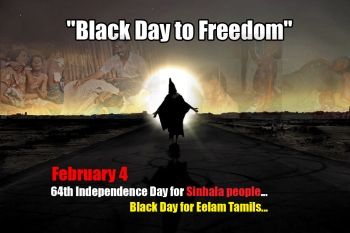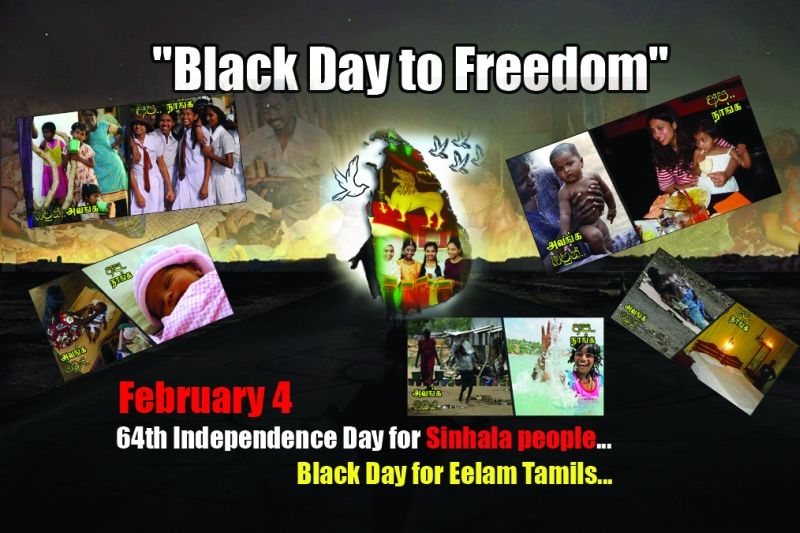Victims of state terrorism have nothing to celebrate on this day.
 1948 was a year one culture in Sri Lanka found independence, and another found oppression. Courtesy: Muthamizh Vendhan |
(SALEM) - How do Native American people really feel each time the 4th of July is celebrated in the United States? A friend of mine has a shirt featuring an Indian warrior with the words, "Fighting Terrorism Since 1492" and that seems to define both the irony and insanity of the USA's never ending boastful celebration of its own ideals.
Each time a society comes to view itself as superior to to others, it has entered its own downfall. The day Sri Lanka's gained independence from British rule, 4th February 1948, was a black day for Eelam Tamils. This minority culture in the north of this island nation labored for self preservation for three decades, from '48 through '78 ... amid an atmosphere of state terrorism and violence.
Support for the Tamils has always flowed across the sea from India. Their cause for liberation which was in the end painted as 'terrorism' was in fact the product of a desperate struggle for equality and the survival of their very culture.
For more than a half century, the Tamil nation has endured severe oppression by the Sri Lankan Sinhalese State which represents both the government, and about 85% of the country's ethnic makeup. Through systematic discriminatory legislation and a series of violent atrocities against the Tamil people, there has been no independence tied to the 4th of February for Tamils.
It was after three decades of oppression that the Tamil people finally took up arms against the Sri Lanka government with the formation of the legendary Tamil Tigers, or LTTE (Liberation Tigers of Tamil Eelam).
As TamilNet wrote of the recent past in Sri Lanka,
| “ | For over 30 years, democratically elected Tamil leaders protested against such oppression through non-violent, democratic and peaceful means. The just demands of the Tamil people were answered with military repression and state terrorism. Promises were made, but never fulfilled; the agreements and pacts entered into became dead letters. The friction between the two peoples (the Sinhalese nation and the Tamil Eelam nation) finally emerged as a major conflict leading to the demand for secession at the 1977, Parliamentary elections. The Tamils overwhelmingly voted a mandate to create the state of Tamil Eelam. The Sri Lankan Government, however, continued its repression, state terrorism and flagrant violations of human rights. It is this brutalisation that led the Tamils to take up arms to defend themselves. The Sri Lanka government has banned both domestic and foreign media from visiting the war zone and reporting independently. The world at large is kept in the dark with only the news put out by the Government, which is one sided and biased. This war is a war without witness. | ” |
TamilNet says that as a result of the oppression beginning in 1948, 70,000 innocent Tamils have been killed and a million Tamils turned into refugees. While they are not all considered casualties, the Genocide in 2009 left more than 160,000 people unaccounted for.
 How this horrific period was allowed to transpire is simple, the government of Majinda Rajapaksa, an ally of the U.S. and Great Britain, had his forces kill or disappear all of the country's pro-Tamil journalists, including many who were Sinhalese.
How this horrific period was allowed to transpire is simple, the government of Majinda Rajapaksa, an ally of the U.S. and Great Britain, had his forces kill or disappear all of the country's pro-Tamil journalists, including many who were Sinhalese.It is extremely noteworthy that many Sinhalese Buddhists simple lament and mourn the mass Genocide their own government committed against the Tamil people two summers ago. No decent human being would support the bloodbath of civilians that took place, however Sri Lanka's media is controlled and resistance press is kept silenced, increasingly, in the post-Genocide period.
The Tamil people are somber today, they know that something rightfully theirs is denied, and that the government that celebrates independence has nothing to celebrate.
